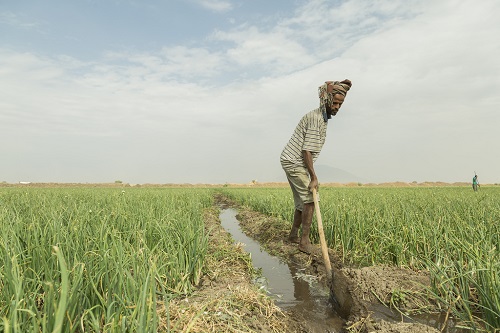IWMI photo
By
Abebe Wolde Giorgis
Many experts agreed that small scale irrigation is helpful for enhancing productivity and ensuring food security particularly in the drought prone regions. According to the Ethiopian Meteorology Agency, there are about 105 woredas which chronically suffer from drought and to reverse the consequence of extreme weather conditions, farmers with the support of extension workers should continue practicing irrigation.
Dr Tilahun Hordofa is a researcher at the Ministry of Agriculture and Natural resource specializing in irrigation and drainage. According to him, small scale irrigation helps enhancing food production and stabilizes food price in urban centers. It can be exercised through the retention of rain water and revitalizing streams and rivers and currently such practice is upscaled nationwide.
However though the government endeavors to expand small scale irrigation due to lack of awareness in low land parts of the country, farmers are misusing water sources and the excessive inflow of water to farms destroys plants, erodes soil and exacerbates soil infertility.
According to Tilahun, farmers knows that water is a valuable asset for raising productivity, though with excessive water to the farm soil nutrients are taken away and the removal of oxygen from the soil causes the death of the plants.
“Crops, fruits and vegetables such as tomato, pepper, salad, cabbage cultivated by small scale irrigation which have high demand in towns” said Merga Kersi who works at the Ministry of Agriculture and Natural Resources as irrigation and drainage engineer.
Merga further said that, the government stands to support the expansion of small scale irrigation because the practice could liberate farmers from rain dependency and enable them to produce twice or three times per year.
However, he suggests that similar to Dr Tilahun, farmers utilize water uneconomically and farm lands are overflown by water. Though irrigation is expanding from time to time, the arbitrary use of water causes wastage. More and more, the unbalanced distribution of water brought its own drawbacks on the far side of the water basin. The availability of excessive amounts of water in soil turned the water salty in arid regions.
In this regard some places in the Somali and Afar regions can be mentioned as a case in point. In Amibara woreda of Afar region and in Gode areas of Somali region due to excessive use of water the salt content of the water is increased and as a result, the farm land has been totally destroyed and desalinating the soil from the salt has became an expensive venture which is beyond the financial capacity of farmers. Hence instead of trying to desalinate the soil, utilizing the water cautiously and economically in a coordinated manner is vital. It is understood that water is one of the major components of farm inputs for enhancing agricultural productivity but recklessness in the utilization of water results in unwanted consequences. “The utilization of irrigation water has its own technique based on the soil type and the plant and the amount of water and disregarding these, achieving positive outcome is impossible” explained Merga.
According to him, drip irrigation in this regard has a high value in utilizing water economically and reducing salt risk thus it is better for farmers to look for other alternatives.
To transform the subsistence farm into a modern one, expanding the irrigation farm is essential but the fragmented settlement of farmers in the high land areas forces farmers to use the water one after the other, the excess inflow of water in one farm reducing the water flow to the other areas.
The uneconomical usage of irrigation water is also observed in the southern Gonder region. According to the zone agriculture office water expert Enye Assefa, among ten woredas in the zone, three of them such as Dera, Fogera, and Limw woredas are dry but by employing their maximum effort they cultivate their farm by underground water through pumping but sometimes the inflow of excess water to the farm causes over utilization hence doing their job with the consultation of extension workers is essential.
The excessive utilization of water in addition to causing wastage poses the occurrence of plant diseases which in turn leave farmers bankrupt.
According to the Ministry of Irrigation and Electric in Ethiopia there is about 5.3 million hectare arable land which can be utilized for irrigation farms but only 3 percent of it is utilized, therefore tapping such potential can alleviate chronic poverty and attain food security.
Currently the majority of the farmers are engaged in rain fed small farms which put them in the trap of drought. Attaining food security in the traditional way of farming is impossible hence at any cost enhancing the scheme is vital.
Abebe Wolde Giorgis
Abebe Wolde Giorgis was born in Harar, Ethiopia. He has a B.A from Addis Ababa University in English Language and Literature, Minor History.
For 17 years he has been a Journalist in local and International Media, Amharic and also an English Newspaper.He wrote several articles on environment and economics.
Member of Environment journalist association, he was deputy editor in chief of an Amharic Newspaper and Senior Editor of the Ethiopian Herald.



No Comments Yet!
You can be first to comment this post!